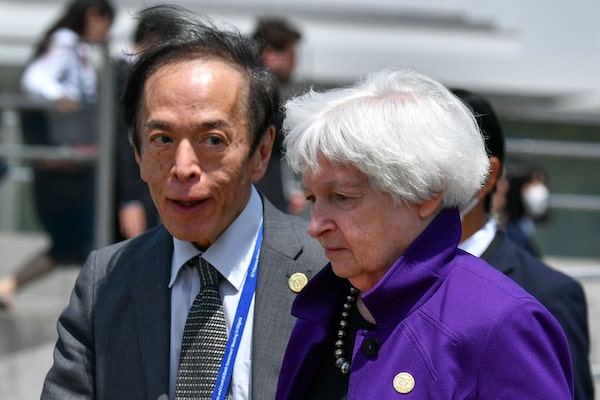Right now, it’s all about deadlines, as lawmakers race to thrash out a deal on the U.S. borrowing limit, voters in Turkey head to the polls and time runs short for Russia and Ukraine to agree on how to keep key grain exports flowing.
Here’s a look at the week ahead in markets:
HOGGING THE G7 SPOTLIGHT

Bank of Japan Governor Kazuo Ueda, left, chats with U.S, Treasury Secretary Janet Yellen while walking on the way to a photo session as part of the G7 Finance Ministers and Central Bank Governors' Meeting at Toki Messe in Niigata on May 12.KAZUHIRO NOGI/AFP/Getty Images
Janet Yellen has a three-pronged focus for the G7 finance ministers meeting under way in Niigata, Japan: tackling global inflation, bolstering long-term growth and redoubling support for Ukraine.
But many of her colleagues may well be asking her how a potentially disastrous U.S. default can be averted.
The U.S. Treasury Secretary delayed the start of her trip to devote more time to tackling the issue. However, bipartisan divides run deep, and President Joe Biden has hinted he may not even make it to Hiroshima for the G7 leaders meeting the following weekend.
That would complicate a reported side summit with Japan and South Korea on strengthening security cooperation. Host nation Japan has more at stake than many in this standoff: It is the largest foreign holder of U.S. debt.
ERDOGAN AND THE ECONOMY
A person walks behind a flag with an image of Turkish President Tayyip Erdogan ahead of the presidential and parliamentary elections, in Istanbul, Turkey May 12.DYLAN MARTINEZ/Reuters
President Tayyip Erdogan has ruled Turkey with a firm grip for more than two decades. He now faces a tight race against opposition rival Kemal Kilicdaroglu when the 85-million-people strong nation votes on Sunday.
Polls suggest Kilicdaroglu has a chance, as many Turks are disenchanted with Erdogan whose unorthodox economic and monetary policy has left them with a sharp decline in living standards, battered by crippling inflation and facing a collapsing lira.
There was also widespread dissatisfaction over how the government responded to a February earthquake that killed more than 50,000 people and left millions homeless.
Erdogan could yet prevail given a strong support base in the devout working-class Anatolian heartland. Even if he doesn’t, it’s hard to envisage the feisty politician quietly bowing out of office.
Should no candidate win the first round outright, a second one is scheduled for May 28. Whoever wins has a challenging task to get the economy back on track.
GOING AGAINST THE GRAIN

A dump track unloads grain in a granary in the village of Zghurivka, Ukraine, on Aug. 9, 2022.Efrem Lukatsky/The Associated Press
Russia and Ukraine have until May 18 to extend the Black Sea grain deal, which last year allowed the safe passage of Ukrainian exports to help tackle a global food crisis.
The two sides could extend the agreement, but Russia says it will walk unless its demands to remove obstacles to its own exports are met. The two are among the world’s biggest exporters and supply some of the poorest countries.
Since Russia invaded Ukraine, wheat futures have dropped by more than 50% from record highs. World food prices have cooled off and the upcoming global harvest is projected to be healthy. That suggests an interruption might not have the same impact as the initial blockade.
But the price of staples such as bread remain sky-high. Bread in the European Union cost almost 20% more in March than a year ago. It’s far worse in the developing world, where a larger share of household incomes are spent on food.
DATA DIVE
A shopper browses for clothing at a Walmart store in Flagstaff, Arizona on Oct. 19, 2022.LISA BAERTLEIN/Reuters
A batch of key economic data will shed fresh light on whether the United States is staving off a downturn given Federal Reserve rate hikes.
Tuesday’s retail sales data will gauge the health of consumer spending, which accounts for more than two-thirds of economic activity. Retail sales fell more than expected in March, as consumers cut back on buying motor vehicles and other big-ticket items.
Reports are also due on industrial production and housing starts, while the Philadelphia Fed manufacturing survey could also influence asset prices next week.
Data on Wednesday showed annual U.S. consumer inflation slowed to below 5% in April for the first time in two years. Still, inflation remained well above the Fed’s 2% target.
HOW RESILIENT?
A crane operator lifts up a finished steel coil at the storage and distribution facility of the German steel maker in Duisburg, Germany, Jan. 30, 2020.Wolfgang Rattay/Reuters
The week ahead brings current and historic assessments of euro area economic growth, with Q1 GDP data and the influential ZEW Institute surveys of business conditions and sentiment in European power house economy Germany.
Economists polled by Reuters expect to see the “flash” estimate will show the euro area eked out growth of just 0.1% in the three months to March. Some economists say stagnation has continued and could result in a recession later this year.
Euro area monetary indicators, such as credit demand, point to steep declines in consumption and investment. Household savings rates are rising as borrowing falls.
None of this is guaranteed to dissuade the European Central Bank from continuing to raise rates, as core inflation, at 5.6% in April, remains too far above its 2% target to overlook.
Be smart with your money. Get the latest investing insights delivered right to your inbox three times a week, with the Globe Investor newsletter. Sign up today.